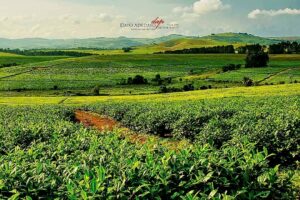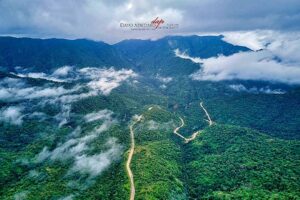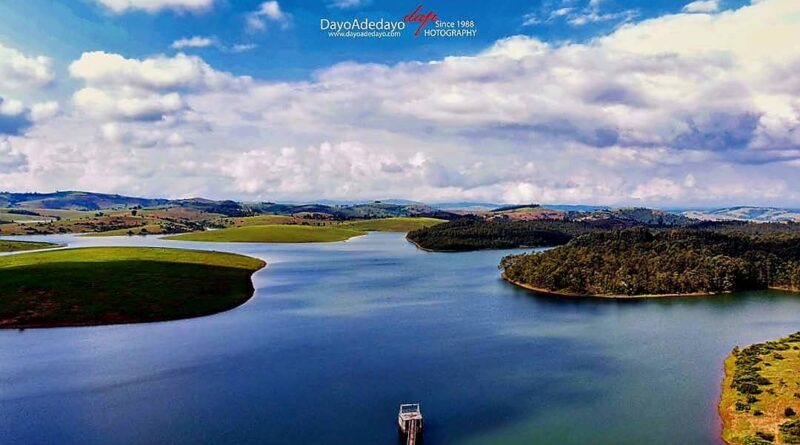The Mambilla Plateau: Heaven’s Balcony in Nigeria
By: ‘dayo Adedayo
It was another beautiful morning. At exactly 5:10 a.m., I began my walk, the streets still wrapped in sleep and the air crisp with promise.
In my ears, the golden voice of Chief Commander Ebenezer Obey flowed like a familiar prayer. His timeless songs, “Africa Is My Home” and “No Place Be Like My Country” became my companions, each lyric a reminder of gratitude and belonging.

As I walked, I reflected on this great country called Nigeria, vast, diverse, and full of paradox. A land so often misunderstood, yet so rich in soul. Some Nigerians, perhaps too many, have made a habit of speaking ill of her, forgetting that love is not reserved for the flawless.
To me, Nigeria is like a marriage, one entered with laughter and hope, tested by time and trials, yet impossible to abandon. Even when we quarrel with her, others look on with admiration, wondering how we cannot see her beauty.
The rhythm of Chief Commander Obey’s music carried me deeper into reflection, every beat stirring old memories and dreams. And then, just as if heaven wanted to join the meditation, a heavy rain began around 6:23 a.m., sudden, unrelenting, and yet strangely comforting. It washed the streets clean, the sound of raindrops drumming in harmony with Obey’s melodies. I smiled to myself; how fitting, I thought. Rain, rhythm, and reflection, all the elements that make Nigeria what she is: raw, emotional, and endlessly beautiful.
My mind drifted to one of her greatest wonders. The Mambilla Plateau in Taraba State the most breathtaking place I have ever seen, and my number one among Nigeria’s ten most beautiful destinations to visit before you go to the great beyond.

I remember that journey as though it were yesterday. On my way to the Mambilla Plateau in Sardauna Local Government, I stopped briefly at the Gashaka Gumpti National Park. I had read so much about it, and I wanted to see its magic for myself. But as fate would have it, the park was fully booked that day. So, I drove on, and that detour became a blessing in disguise.
Glancing into my rear-view mirror as I climbed toward Gembu, I saw the crowns of countless trees, their colors alive with morning light. It was as though nature herself had decided to paint. In that moment, Chief Commander Obey’s words returned to my heart, songs of rain, forest, and sunshine. The eternal beauty of Nigeria.
To me, Chief Commander Ebenezer Obey is not just a musician; he is divine inspiration. Like Ogun, Obatala, or Sango are deities of power and wisdom, Chief is the god of music. His voice, to me, is prophecy. When I seek clarity, I turn to his songs or to my Bible. Between both lies the sacred balance that keeps my spirit grounded and my vision alive.
And so, the journey continued, winding upward into the clouds. The Mambilla Plateau opened up like a dream made real. Canopies of trees arched gracefully over the road, while pine trees, planted decades ago by German settlers, stood in proud symmetry. Their trunks told stories of time, endurance, and quiet strength.
Soon, the vast Kakara Tea Plantation unfolded before me. A sea of green stretching endlessly, bathed in mist and sunlight. The air was sweet with the scent of tea, and every breath felt pure. Here, nature and humanity coexist in silent rhythm, the land giving abundantly to those who treat it with care.
Hidden beyond the hills lies the Mambilla Waterfall that enchanting wonder. Her waters fall in shimmering silver sheets, cascading down from the high rocks with graceful majesty. When sunlight pierces her mist, a rainbow often bows at her feet, a symbol of peace between heaven and earth.
From the bottom of the hill to Gembu, it was 122 kilometers of pure magic. As I ascended, grasslands stretched wide, valleys folded into one another, and clouds began to kiss the earth. At Chappal Waddi, Nigeria’s highest peak at 7,936 feet, I stood not beneath the clouds but among them. The air there is crisp, the silence holy. And during harmattan, the cold wind bites. A reminder that even paradise has its seasons.
Below, the Donga and Taraba Rivers meet in a sacred dance, flowing toward the Benue, and then onward to the Niger at Lokoja. A story of unity written in water. The Tunga Dam glistens like crystal, its water as clear as the Scottish springs that inspire poets. I once dipped my hand into that cool current, drank deeply, and whispered a prayer:
May my life be as calm and refreshing as this water. May Nigeria continue to bless me, and may her beauty never fade.
To visit the Mambilla Plateau is to visit heaven’s balcony, a place where the clouds descend to hold you and the breeze sings its lullaby. During the rainy season, you may find yourself standing in a cloud, wrapped in white mist, floating between sky and earth. You feel light, humbled, and whole.
From the roadside, as your eyes sweep across the endless plains below, one question arises again and again: Why are we not where we should be? But even as the thought comes, hope answers it. I believe, deeply, that in no distant future, Nigeria will rise to her greatness. Her stories will be told far and wide, her glory sung in every tongue.
As I stood there once upon a time, and as I walked this morning beneath the rain, I heard Chief Commander’s voice again in my mind:
“No place be like my country.”
And so I say, with pride and conviction:
May Nigeria succeed.
May her rivers flow forever.
May her hills whisper grace.
And may her children never tire of singing her praises.




